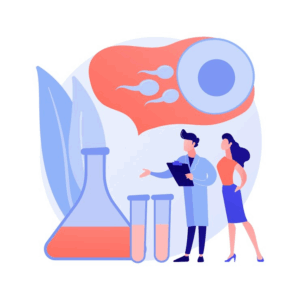Introduction
What happens if your sperm count is 0? Fertility is an essential aspect of reproductive health, and for men, sperm count plays a critical role in conception. If a semen analysis reveals that your sperm count is 0, it means you have a condition called azoospermia. This condition can be concerning, but understanding its causes, diagnosis, and possible treatments can help men navigate the situation. In this article, we will explore what happens if your sperm count is 0, the possible reasons behind it, and potential solutions.
Understanding Azoospermia
Azoospermia is a medical condition where there is no measurable sperm in the semen. It affects about 1% of all men and accounts for 10-15% of male infertility cases. There are two main types of azoospermia:
- Obstructive Azoospermia (OA) – The testicles produce sperm, but a blockage prevents sperm from being released into the semen.
- Non-Obstructive Azoospermia (NOA) – The testicles do not produce enough sperm or do not produce sperm at all.
Causes of Zero Sperm Count
Several factors can contribute to a 0 sperm count. The causes can be classified as obstructive or non-obstructive:
1. Obstructive Causes
These occur when there is a blockage in the male reproductive tract, preventing sperm from reaching the semen. Some common causes include:
- Vasectomy – A surgical procedure to cut or block the vas deferens, preventing sperm from reaching the semen.
- Congenital absence of the vas deferens – A genetic condition where a man is born without the tubes that carry sperm.
- Infections – Sexually transmitted infections (STIs) or other infections that cause scarring and block sperm flow.
- Ejaculatory duct obstruction – A blockage in the ducts that transport sperm from the testicles to the urethra.
2. Non-Obstructive Causes
These occur when the body is unable to produce sperm. Some common reasons include:
- Hormonal Imbalances – Low testosterone, high follicle-stimulating hormone (FSH), or other hormonal issues that affect sperm production.
- Genetic Conditions – Disorders like Klinefelter syndrome or Y chromosome microdeletions can affect sperm production. What happens if your sperm count is 0?
- Testicular Failure – Damage or dysfunction in the testicles due to chemotherapy, radiation, infections, or testicular injury.
- Varicocele – Enlarged veins in the scrotum that can cause overheating and impact sperm production.
Symptoms of Zero Sperm Count
Most men with azoospermia do not experience obvious symptoms. However, some possible signs include:
- Difficulty conceiving a child
- Low libido or erectile dysfunction (if hormone-related)
- Swelling or pain in the testicles (if caused by an infection or varicocele)
- Small or undescended testicles (may indicate genetic or developmental issues)
How Is Azoospermia Diagnosed?
If a man is diagnosed with zero sperm count, doctors will conduct several tests to determine the underlying cause:
1. Semen Analysis
- Conducted in a lab to check for sperm presence.
- If no sperm is found, further testing is needed.
2. Blood Tests
- Measures hormone levels like testosterone, FSH, and LH.
- Helps identify hormonal imbalances affecting sperm production.
3. Genetic Testing
- Checks for genetic disorders like Klinefelter syndrome or Y chromosome deletions.
- Helps determine if the condition is hereditary.
4. Scrotal Ultrasound
- Detects varicoceles, testicular abnormalities, or blockages.
- Helps assess testicular structure and blood flow.
5. Testicular Biopsy
- A small tissue sample from the testicles is examined for sperm production.
- Helps determine if sperm are being produced but not reaching semen.
Treatment Options for Zero Sperm Count
The treatment of azoospermia depends on the cause. Some possible treatment approaches include:
1. Surgery for Obstructive Azoospermia
- Vasectomy Reversal – If azoospermia is due to a previous vasectomy, a reversal surgery can restore sperm flow.
- Surgical Sperm Retrieval – Techniques like TESE (Testicular Sperm Extraction) or Micro-TESE can extract sperm directly from the testicles for use in assisted reproduction.
- Ejaculatory Duct Obstruction Surgery – Removes blockages to restore sperm flow.
2. Hormonal Therapy for Non-Obstructive Azoospermia
- If the issue is due to low testosterone or hormone imbalances, doctors may prescribe Clomid, hCG injections, or FSH therapy to stimulate sperm production.
3. Treatment for Varicocele
- Surgery called varicocelectomy can help improve sperm production in men with varicoceles.
4. Assisted Reproductive Techniques (ART)
- In-vitro fertilization (IVF) + Intracytoplasmic Sperm Injection (ICSI) – If viable sperm is retrieved, it can be injected directly into an egg for fertilization.
5. Lifestyle Changes to Improve Fertility
While not a direct cure, certain lifestyle changes can support sperm health:
- Eat a nutrient-rich diet – Include antioxidants, zinc, and omega-3 fatty acids.
- Exercise regularly – But avoid overtraining, which can lower testosterone.
- Reduce stress – Chronic stress affects hormone levels and sperm production.
- Avoid toxins – Limit exposure to pesticides, heavy metals, and radiation.
- Quit smoking and alcohol – These can damage sperm production and quality.
Can Men with Zero Sperm Count Still Have Biological Children?
Yes, depending on the cause. Obstructive azoospermia is often treatable with surgery or sperm retrieval techniques. Non-obstructive azoospermia is more challenging, but in some cases, sperm may still be retrieved from the testicles for assisted reproduction.
If sperm retrieval is unsuccessful, alternatives like sperm donation or adoption are options for men who wish to become fathers.



